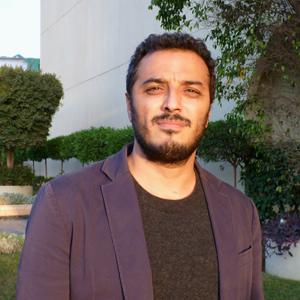Egyptian political opposition disillusioned after bloody clash with Muslim Brotherhood
Waleed El-Ganzouri says he was illegally detained, threatened and beaten by supporters of the Muslim Brotherhood. (Photo by Matthew Bell.)
The political opposition in Egypt Wednesday called on the public to vote “no” on a controversial draft constitution.
The referendum on the text is scheduled to take place in two days of voting.
Meanwhile, details have emerged on last week’s violence during demonstrations at the presidential palace. Opponents of President Mohammed Morsi say the Muslim Brotherhood carried out illegal detentions and beatings of anti-government protestors. It was the worst episode of violence in this latest political crisis in Egypt.
By all accounts, it was vicious and bloody. Several people were killed in the street fight that took place outside the presidential palace last Wednesday night. Hundreds were injured.
In an online video said to be shot at the scene, a young man with a bandage on his forehead said protestors were attacked by Muslim Brotherhood supporters with rocks, sticks and guns.
“They called us infidels,” he said, “enemies of God. And they detained us.”
Other accounts are similar. Including from Waleed El-Ganzouri, a 35 year-old Egyptian engineer and businessman, educated in Britain. Ganzouri said he went to the palace to take part in anti-Morsi demonstrations. Things got violent, he said, when Brotherhood members and their supporters attacked.
“It was peaceful until they came and they started throwing stones and — it was messed up. Still I have five cuts and I have some bruises, but it’s fine now. I would say I’m lucky, you have to see the other guys’ faces,” he said.
Ganzouri said he was one of dozens of men rounded up by Brotherhood men that night and beaten repeatedly. He said the men kept asking three questions: “Who brought you here?” “How much were you paid?” And, “what drugs are you on?”
“After they caught me,” Ganzouri said, “they started beating me up and they told me that, ‘we’re gonna kill you, because two of our Brothers were killed.’ I thought they were going to kill me. I knew they were going to kill me. So, I, it’s not about scared or not. It’s over. Game over. I didn’t believe it when they dropped me to the police station.”
Once in police custody, Ganzouri said the mistreatment stopped. He was questioned, held for 48 hours and then released.
The night after the violence occurred, President Morsi gave a speech and said that detainees were caught with weapons. He said they had confessed during interrogations to being paid. And that they were tied to unnamed political forces inside Egypt or abroad. Soon after the speech ended, prosecutors released nearly all of those in custody.
Human Rights Watch issued a statement criticising Morsi for failing to condemn illegal detentions and abuse that occurred just outside the presidential palace.
Gehad El-Haddad, a spokesman with the Muslim Brotherhood, rejected allegations that the organization behaved like an extrajudicial vigilante group during last week’s violence.
“In layman political terms, the Muslim Brotherhood went and stepped in as a human shield between an attempted coup by a group of hired thugs mixed with revolutionary supporters against a democratically elected president,” Haddad said.
As for the contention that there is a foreign-funded conspiracy to bring down the Egyptian government, Heddad said he gets why people are suspicious, and he wants President Morsi to show the evidence that will prove what he says.
“I think that the president should really come out and disclose what he has,” he said. “It’s been quite frustrating for many of us to have to defend what we know is a fact and what we know that the presidency has enough information on.”
Haddad said the Muslim Brotherhood will do whatever it takes to defend Egypt’s democracy and the will of its people. But there’s a backlash against the Brotherhood going on. The group says 10 of its members have been killed, more than 1400 injured and more than two dozen of its offices have been attacked in recent weeks.
Mustapha Kamal Al-Sayyid, a professor of political science at Cairo University, said the reports about the detentions and abuse might not be the tipping point. But he said many Egyptians are becoming disillusioned with the Muslim Brotherhood.
“You know people had very good ideas about how efficient, how honest, how clever Muslim Brothers would be in running the country. And we saw a level of incompetence that far exceeds anything that was experienced at the time of Hosni Mubarak,” Sayyid said.
When Morsi was first elected, the public was focused on the new president’s ambitious pledge to improve the everyday lives of Egyptians. These days, people wonder how the country will get through the current crisis.
Every day, reporters and producers at The World are hard at work bringing you human-centered news from across the globe. But we can’t do it without you. We need your support to ensure we can continue this work for another year.
Make a gift today, and you’ll help us unlock a matching gift of $67,000!
